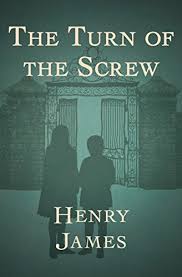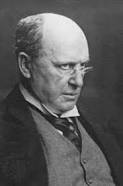The Turn of the Screw Page #8
The Turn of the Screw is an 1898 horror novella by Henry James that first appeared in serial format in Collier's Weekly magazine. In October 1898 it appeared in The Two Magics, a book published by Macmillan in New York City and Heinemann in London.
There was a Sunday—to get on—when it rained with such force and for so many hours that there could be no procession to church; in consequence of which, as the day declined, I had arranged with Mrs. Grose that, should the evening show improvement, we would attend together the late service. The rain happily stopped, and I prepared for our walk, which, through the park and by the good road to the village, would be a matter of twenty minutes. Coming downstairs to meet my colleague in the hall, I remembered a pair of gloves that had required three stitches and that had received them—with a publicity perhaps not edifying—while I sat with the children at their tea, served on Sundays, by exception, in that cold, clean temple of mahogany and brass, the “grown-up” dining room. The gloves had been dropped there, and I turned in to recover them. The day was gray enough, but the afternoon light still lingered, and it enabled me, on crossing the threshold, not only to recognize, on a chair near the wide window, then closed, the articles I wanted, but to become aware of a person on the other side of the window and looking straight in. One step into the room had sufficed; my vision was instantaneous; it was all there. The person looking straight in was the person who had already appeared to me. He appeared thus again with I won’t say greater distinctness, for that was impossible, but with a nearness that represented a forward stride in our intercourse and made me, as I met him, catch my breath and turn cold. He was the same—he was the same, and seen, this time, as he had been seen before, from the waist up, the window, though the dining room was on the ground floor, not going down to the terrace on which he stood. His face was close to the glass, yet the effect of this better view was, strangely, only to show me how intense the former had been. He remained but a few seconds—long enough to convince me he also saw and recognized; but it was as if I had been looking at him for years and had known him always. Something, however, happened this time that had not happened before; his stare into my face, through the glass and across the room, was as deep and hard as then, but it quitted me for a moment during which I could still watch it, see it fix successively several other things. On the spot there came to me the added shock of a certitude that it was not for me he had come there. He had come for someone else. The flash of this knowledge—for it was knowledge in the midst of dread—produced in me the most extraordinary effect, started as I stood there, a sudden vibration of duty and courage. I say courage because I was beyond all doubt already far gone. I bounded straight out of the door again, reached that of the house, got, in an instant, upon the drive, and, passing along the terrace as fast as I could rush, turned a corner and came full in sight. But it was in sight of nothing now—my visitor had vanished. I stopped, I almost dropped, with the real relief of this; but I took in the whole scene—I gave him time to reappear. I call it time, but how long was it? I can’t speak to the purpose today of the duration of these things. That kind of measure must have left me: they couldn’t have lasted as they actually appeared to me to last. The terrace and the whole place, the lawn and the garden beyond it, all I could see of the park, were empty with a great emptiness. There were shrubberies and big trees, but I remember the clear assurance I felt that none of them concealed him. He was there or was not there: not there if I didn’t see him. I got hold of this; then, instinctively, instead of returning as I had come, went to the window. It was confusedly present to me that I ought to place myself where he had stood. I did so; I applied my face to the pane and looked, as he had looked, into the room. As if, at this moment, to show me exactly what his range had been, Mrs. Grose, as I had done for himself just before, came in from the hall. With this I had the full image of a repetition of what had already occurred. She saw me as I had seen my own visitant; she pulled up short as I had done; I gave her something of the shock that I had received. She turned white, and this made me ask myself if I had blanched as much. She stared, in short, and retreated on just my lines, and I knew she had then passed out and come round to me and that I should presently meet her. I remained where I was, and while I waited I thought of more things than one. But there’s only one I take space to mention. I wondered why she should be scared. V Oh, she let me know as soon as, round the corner of the house, she loomed again into view. “What in the name of goodness is the matter—?” She was now flushed and out of breath. I said nothing till she came quite near. “With me?” I must have made a wonderful face. “Do I show it?” “You’re as white as a sheet. You look awful.” I considered; I could meet on this, without scruple, any innocence. My need to respect the bloom of Mrs. Grose’s had dropped, without a rustle, from my shoulders, and if I wavered for the instant it was not with what I kept back. I put out my hand to her and she took it; I held her hard a little, liking to feel her close to me. There was a kind of support in the shy heave of her surprise. “You came for me for church, of course, but I can’t go.” “Has anything happened?” “Yes. You must know now. Did I look very queer?” “Through this window? Dreadful!” “Well,” I said, “I’ve been frightened.” Mrs. Grose’s eyes expressed plainly that she had no wish to be, yet also that she knew too well her place not to be ready to share with me any marked inconvenience. Oh, it was quite settled that she must share! “Just what you saw from the dining room a minute ago was the effect of that. What I saw—just before—was much worse.”
Translation
Translate and read this book in other languages:
Select another language:
- - Select -
- 简体中文 (Chinese - Simplified)
- 繁體中文 (Chinese - Traditional)
- Español (Spanish)
- Esperanto (Esperanto)
- 日本語 (Japanese)
- Português (Portuguese)
- Deutsch (German)
- العربية (Arabic)
- Français (French)
- Русский (Russian)
- ಕನ್ನಡ (Kannada)
- 한국어 (Korean)
- עברית (Hebrew)
- Gaeilge (Irish)
- Українська (Ukrainian)
- اردو (Urdu)
- Magyar (Hungarian)
- मानक हिन्दी (Hindi)
- Indonesia (Indonesian)
- Italiano (Italian)
- தமிழ் (Tamil)
- Türkçe (Turkish)
- తెలుగు (Telugu)
- ภาษาไทย (Thai)
- Tiếng Việt (Vietnamese)
- Čeština (Czech)
- Polski (Polish)
- Bahasa Indonesia (Indonesian)
- Românește (Romanian)
- Nederlands (Dutch)
- Ελληνικά (Greek)
- Latinum (Latin)
- Svenska (Swedish)
- Dansk (Danish)
- Suomi (Finnish)
- فارسی (Persian)
- ייִדיש (Yiddish)
- հայերեն (Armenian)
- Norsk (Norwegian)
- English (English)
Citation
Use the citation below to add this book to your bibliography:
Style:MLAChicagoAPA
"The Turn of the Screw Books." Literature.com. STANDS4 LLC, 2025. Web. 9 Mar. 2025. <https://www.literature.com/book/the_turn_of_the_screw_330>.








Discuss this The Turn of the Screw book with the community:
Report Comment
We're doing our best to make sure our content is useful, accurate and safe.
If by any chance you spot an inappropriate comment while navigating through our website please use this form to let us know, and we'll take care of it shortly.
Attachment
You need to be logged in to favorite.
Log In